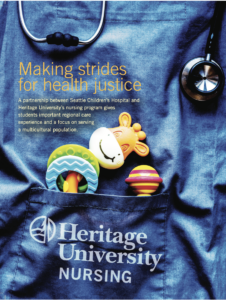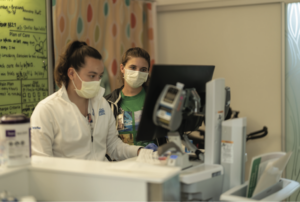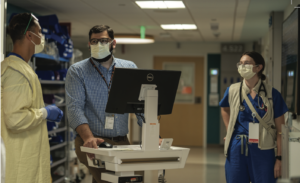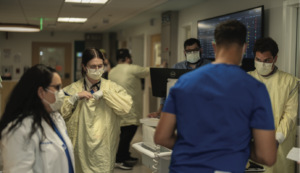Making strides for health justice – WINGS Summer 2023

Each June, during the semester between their junior and senior years, a dozen Heritage University nursing students leave the Yakima Valley to work at one of the largest specialized care centers for children in the nation.
In an innovative joint effort between Heritage’s nursing department and Seattle Children’s Hospital, the students enter a four-week pediatric care clinical rotation. They tend to patients under the tutelage of veteran nurses and gain a working understanding of the realities and practicalities of caring for sick and chronically ill children and their families.
Each student’s 120 hours at Seattle Children’s represents an important type of diversification in their clinical experience, a full year before graduation – one that expands their consciousness and their experience while enhancing the hospital’s growing commitment to diversity.
Seattle Children’s began hosting small cohorts of Heritage nursing students in 2017, and the program has continuously evolved and grown since.
The hospital provides Heritage and its students with several significant resources: a nursing professional who works as an adjunct faculty member at Heritage during the academic year prior to the students’ rotation, housing in the University of Washington dorms during their clinical rotation at Children’s; the option to return for an intensive 160- to 180-hour senior preceptorship; and upon graduation, guaranteed employment interviews. If hired, relocation to the Seattle area is paid for by Seattle Children’s.
A GROWING PARTNERSHIP
Beginning in their junior year, Heritage nursing students traditionally do multi-week, on- location clinical practice in various disciplines: women’s health and maternity, primary care of children, family health, and hospitalized adults. They work in community health and critical care, at hospitals throughout the Yakima Valley, and even at Heritage’s Early Learning Center.
The experience of Seattle Children’s turns things up a notch. Students gain experience in a highly complex system of care for acutely and chronically ill children and their families who come from a four-state area and include Latinx, indigenous, and undocumented children. Heritage’s student population is demographically similar; 80 percent of students are people of color.
The first steps of the partnership took place when Christina Nyirati, Ph.D., R.N. and Debra Ridling, Ph.D, R.N. first spoke in 2015. Nyirati is the director of the Bachelor of Science in Nursing (B.S.N.) program and chair of Heritage’s nursing department. Ridling is Associate Chief Nurse and Senior Director of Nursing Practice and Research at Seattle Children’s.
“I knew they were pretty saturated because they host 800 nursing students every year,” said Nyirati. “But we explored whether there could be a relationship that would benefit our students and Seattle Children’s and its patients and families. The arrangement has grown to what we’re doing today.”
BRIDGING CULTURES
Seattle Children’s prospectus on the project included the following statements: “The C.D.C. declared racism a serious public health threat in 2021. The National Academy of Medicine’s ‘Future of Nursing 2020-2030’ report declared action was needed to interrupt disparities that are systemic throughout healthcare.” 
“They identify one strategy as increasing the diversity of the nursing workforce to better reflect the population,” said Ridling. “That’s a big part of what this program is about. Heritage students share the same cultures, language and background as many of our families, and that goes a long way in making them feel more comfortable. They see someone they identify with. They converse in their native language.
“They act as cultural brokers for this facility, and that’s a huge benefit to Seattle Children’s.”
Heritage nursing curriculum includes learning about “ethical comportment,” meaning their manner or presence, and that, to practice ethically, they must at times speak up on behalf of patients and families. They are taught to bring their lived experience and knowledge to their practice.
“Our students bring a realness and a humility to the experience of nursing,” said Nyirati. “We make sure they know that their background is rich and important, that they come to us already with that, and we’re there to expand on it. We cultivate their courage to be that presence.”
NURSE BENEFITS STUDENTS
Ten months before this year’s cohort of Heritage nursing students crossed the Cascade Mountains to Seattle, the nurse who would help provide an early connection from the Yakima Valley to Seattle made her way to Toppenish.
Bilingual and bicultural hospital-based nurse Genevieve Aguilar was selected to join the Heritage staff as interim joint faculty. She contributed to two semesters of clinical practice instruction and helped integrate students’ knowledge of theoretical nursing concepts into clinical practice.
Aguilar developed a unique connection with the students, enhancing it with an open-door policy and a personal touch.
“I think many of the students could easily see themselves in me,” Aguilar said. “I shared a lot about my journey, including in real time, as I applied for my Ph.D. studies. They got a sense of what that might be like for them.
“I think it’s been a mutual understanding from a cultural perspective.”
SUSTAINING THE PROGRAM
While at Seattle Children’s, Heritage nursing students do assessments, give medications, listen, watch, ask questions, and absorb it all. When solicited, they share their clinical reasoning.
“Our students are taking care of children with highly complex health problems; they’re not just observing, they’re practicing nursing under close supervision of faculty,” said Ridling. “They tell us they’re treated as professionals and colleagues, that the nurses pull them in and want them to learn.”
Once they graduate, many Heritage nursing school alumni will remain in the Yakima Valley, where their hearts reside, to serve their communities. Some will practice on Yakama land, serving indigenous people whose access to healthcare is limited. Some will take their place at Seattle Children’s. Some will further their education. A graduate may choose to become a certified pediatric nurse, pursue a Doctor of Nursing Practice (D.N.P.) degree, or get their Ph.D.
As they evolve along their paths, the program they participated in will evolve as well. Development professionals at Seattle Children’s and Heritage are working to provide for its growth.
“We’re talking to people and organizations we both have relationships with about how we can improve health care outcomes in rural communities and at this regional hospital,” said Rueben Mayes, Regional Partnerships and Philanthropy Officer at Seattle Children’s. “This work is something Heritage has been doing successfully with Seattle Children’s for six years now, and it’s growing.”
The housing is costly. Mayes points out the senior preceptorship program will be growing, and the relocation stipend needs to increase.
“We’re looking for sustainable funding for all of it through an endowment.”
Nyirati’s vision for Heritage Nursing and Seattle Children’s extends even further.
“Our dream is to have an endowed chair, someone who is an experienced, doctorally prepared professor of nursing, who would come with years of experience in bridging both the practice and nursing education, that would benefit both organizations,” she said.
“It can leverage both of our organizations to become national leaders in modeling this equitable pathway toward transforming the health of all the nation’s children.
“We can do this not only for the Valley and Washington State, but for the nation.”

A recent report by the National Academy of Medicine (NAM) predicted that the United State’s healthcare system will face a number of challenges over the next decade – An aging population with more complex medical needs; an ever-growing shortage of medical professionals, including skilled nurses; and social factors that influence both people’s health and wellness as well as their ability to access quality healthcare. Topping the list of actions needed to adequately address these concerns are educational programs that train nurses to work with diverse populations in community-based healthcare.
With its student body that is more than 75% Latinx and Native American, this area is where Heritage shines. However, continuing to provide high-quality nursing education that meets these standards has its challenges.
“Nursing is an expensive program for colleges,” said David Wise, vice president for Advancement. “When you look at all of the elements within the program: recruiting doctoral-level faculty, the simulators and medical equipment students first learn to use on campus, not to mention the expenses that come from the clinical rotations at medical facilities throughout the region, the costs can be enormous.
However, the implications of this program for the health and welfare of the communities we serve are equally as enormous. That’s why we are building an endowment explicitly dedicated to securing the nursing program’s financial welfare.”
This fall, Heritage and its partner, Seattle Children’s Hospital, are each launching capital campaigns to build endowments to support Heritage nursing education. Funds raised by Seattle Children’s Hospital will defray financial barriers, such as housing and relocation expenses, that Heritage students face while undergoing their four-week practicum. Additionally, it will fund joint-faculty appointments where hospital nursing staff are loaned to Heritage for teaching positions on campus.
Heritage’s endowment will provide the university with the necessary resources to attract and retain distinguished faculty members, who will bring their expertise and experience to enhance the academic programs within the nursing department. These positions will facilitate developing and implementing innovative teaching and learning techniques that will enable students to acquire the necessary skills and knowledge to succeed in their careers.
YOU CAN HELP ENSURE THE FUTURE OF THE NURSING PROGRAM AT HERITAGE UNIVERSITY THROUGH YOUR GIFTS TO THE NURSING ENDOWMENT. VISIT HERITAGE.EDU/GIVING TO MAKE YOUR GIFT TODAY.
